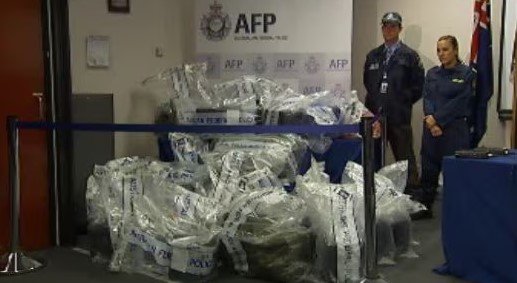A record-breaking narcotics seizure in Ontario is sending shockwaves far beyond Canada’s borders, with investigators now unravelling a troubling nexus between organized crime, Khalistani activism, and foreign intelligence.
In a sweeping investigation named Project Pelican, Peel Regional Police seized 479 kilograms of cocaine — the biggest drug bust in Canadian history. But the real story might lie in who was behind it and where the money was going.
Inside the Sting That Caught Canada’s Biggest Drug Network
Police say they’ve dismantled a sprawling criminal enterprise, one that used commercial trucking routes between the U.S. and Canada to move staggering volumes of cocaine sourced from Mexican cartels. Authorities arrested nine people, seven of whom are of Indian origin and residents of Canada.
The cocaine haul, valued at roughly $47.9 million, was found “bricked” and packed for distribution. Two loaded semi-automatic handguns were also recovered.
Peel Regional Police Chief Nishan Duraiappah said the seizure was “historic,” and praised the cooperation between Canadian agencies, U.S. DEA, and border services.

Drug Money Funding Politics and Protests?
Now the stakes are getting geopolitical.
Canadian intelligence sources have indicated the funds from this drug operation weren’t just used for luxury cars and laundered bank accounts. According to those familiar with the case, some of the proceeds were allegedly channelled into anti-India activities — everything from organizing referendums to purchasing weapons and planning political demonstrations.
Here’s what sources are saying:
-
Intelligence links the operation to pro-Khalistani elements in Canada
-
Pakistan’s ISI is suspected to have facilitated connections between these groups and Mexican drug suppliers
-
Afghan heroin was also reportedly trafficked by the same network
That’s a tangled web — drugs, weapons, politics, and foreign meddling.
A Peek into Project Pelican’s Timeline
This operation wasn’t overnight.
Peel Regional Police launched Project Pelican more than a year ago. It began with a routine narcotics investigation in Brampton and spiraled into something much larger.
Here’s a brief breakdown of the investigative highlights:
| Phase | Details |
|---|---|
| Launch (2024) | Brampton tipoff leads to early surveillance on suspicious cargo routes |
| Mid-2024 | Evidence of cartel ties and weapons caches surfaces |
| Late 2024 | DEA joins after discovering U.S.-Canada narcotics trail |
| April 2025 | Intercepts confirm ISI-Khalistani angle |
| June 2025 | Final raid executed; 479 kg cocaine seized, 9 arrested |
The suspects are now facing multiple charges, including conspiracy to traffic cocaine, possession of prohibited firearms, and laundering proceeds of crime. All are being held for bail hearings in Brampton.
Who Are the People Behind This?
The accused aren’t faceless figures.
Among the arrested is Sajgith Yogendrarajah, a 31-year-old believed to be a key coordinator. Most of the others are men in their late 20s and early 30s, all based in Ontario with no prior criminal records that flagged immediate concern.
One suspect reportedly worked in logistics, another in customs brokerage. That, investigators say, made it easier for them to smuggle cocaine hidden in legitimate freight — furniture, electronics, you name it.
“This wasn’t some street gang slinging dope,” said one officer familiar with the bust. “They ran it like a corporation.”
Delhi Watches Closely as Ottawa Walks a Tightrope
India is keeping a close eye.
This bust — and its alleged links to Khalistani separatists and Pakistan’s ISI — feeds directly into India’s longstanding concerns about extremist networks operating with impunity on Canadian soil.
Tensions between India and Canada already boiled over last year after the killing of Hardeep Singh Nijjar, a pro-Khalistan figure. New Delhi accused Ottawa of harbouring extremists, while Canada said Indian intelligence may have been involved in Nijjar’s death.
The Pelican bust, while not directly tied to that case, adds a fresh layer of strain.
India’s foreign ministry hasn’t made a public comment yet, but government officials say they’re watching developments “very carefully.”
What This Means for Canada’s Domestic Politics
Politically, this could get messy.
Prime Minister Justin Trudeau’s administration has come under fire before for being perceived as soft on Khalistani extremism. Critics argue that the government’s failure to address foreign influence and terrorism risks inside Canada has now come back to bite them.
Opposition leaders are already calling for a parliamentary inquiry.
“This isn’t just a drug bust,” said one MP. “It’s a national security failure.”
Some experts fear this could lead to further souring of Canada’s ties with India — especially if Ottawa fails to prosecute the suspects to the fullest extent or downplays the ISI angle.
One Canadian intelligence analyst warned: “We may be looking at the start of a very complicated political and diplomatic reckoning.”
